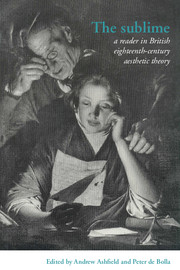Book contents
- Frontmatter
- Contents
- List of Abbreviations
- Introduction
- Part I The Longinian tradition
- Part II Rhapsody to rhetoric
- Part III Irish Perspectives
- Part IV The Aberdonian Enlightenment
- Part V Edinburgh and Glasgow
- 34 A treatise of human nature (1739-40)
- 35 A critical dissertation on the poems of Ossian (1763)
- 36 Lectures on rhetoric and belles lettres (1783)
- 37 Elements of criticism (1765)
- 38 Essays on philosophical subjects (1758/1795)
- 39 The theory of moral sentiments (1759/1790)
- 40 An essay on the history of civil society (1767)
- Part VI From the Picturesque to the Political
- Sources and further reading
36 - Lectures on rhetoric and belles lettres (1783)
Published online by Cambridge University Press: 05 June 2012
- Frontmatter
- Contents
- List of Abbreviations
- Introduction
- Part I The Longinian tradition
- Part II Rhapsody to rhetoric
- Part III Irish Perspectives
- Part IV The Aberdonian Enlightenment
- Part V Edinburgh and Glasgow
- 34 A treatise of human nature (1739-40)
- 35 A critical dissertation on the poems of Ossian (1763)
- 36 Lectures on rhetoric and belles lettres (1783)
- 37 Elements of criticism (1765)
- 38 Essays on philosophical subjects (1758/1795)
- 39 The theory of moral sentiments (1759/1790)
- 40 An essay on the history of civil society (1767)
- Part VI From the Picturesque to the Political
- Sources and further reading
Summary
Lecture III
Criticism. – Genius. – Pleasures of taste. –Sublimity in objects
… I shall begin with considering the pleasure which arises from sublimity or grandeur, of which I propose to treat at some length; both, as this has a character more precise and distinctly marked, than any other, of the Pleasures of the Imagination, and as it coincides more directly with our main subject. For the greater distinctness I shall, first, treat of the grandeur or sublimity of external objects themselves, which will employ the rest of this lecture; and, afterwards, of the description of such objects, or, of what is called the sublime in writing, which shall be the subject of a following lecture. I distinguish these two things from one another, the grandeur of the objects themselves when they are presented to the eye, and the description of that grandeur in discourse or writing; though most critics, inaccurately I think, blend them together; and I consider grandeur and sublimity as terms synonymous, or nearly so. If there be any distinction between them, it arises from sublimity's expressing grandeur in its highest degree.
It is not easy to describe, in words, the precise impression which great and sublime objects make upon us, when we behold them; but every one has a conception of it. It consists in a kind of admiration and expansion of the mind; it raises the mind much above its ordinary state; and fills it with a degree of wonder and astonishment, which it cannot well express.
- Type
- Chapter
- Information
- The SublimeA Reader in British Eighteenth-Century Aesthetic Theory, pp. 213 - 223Publisher: Cambridge University PressPrint publication year: 1996



